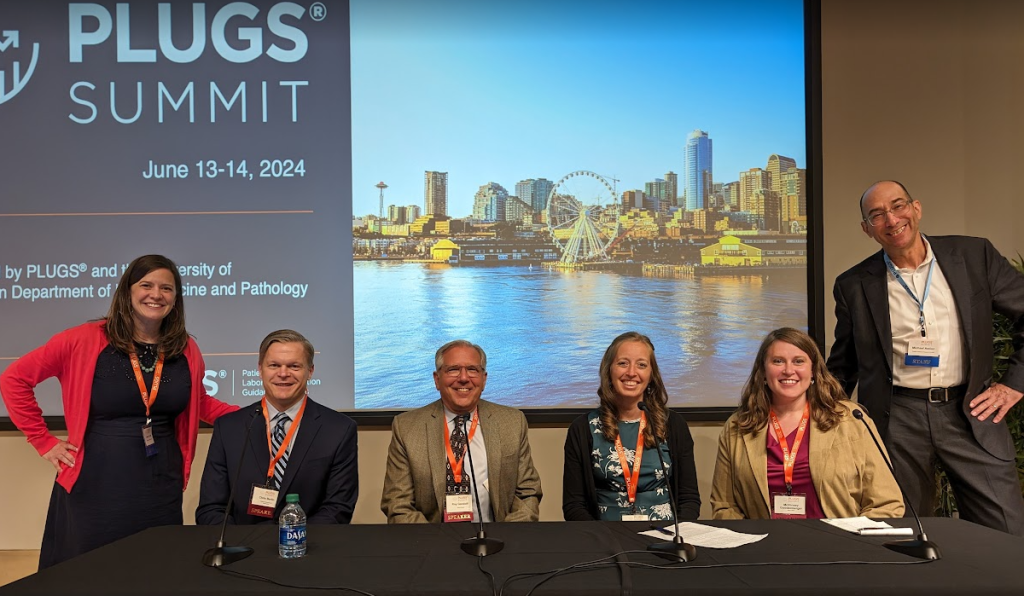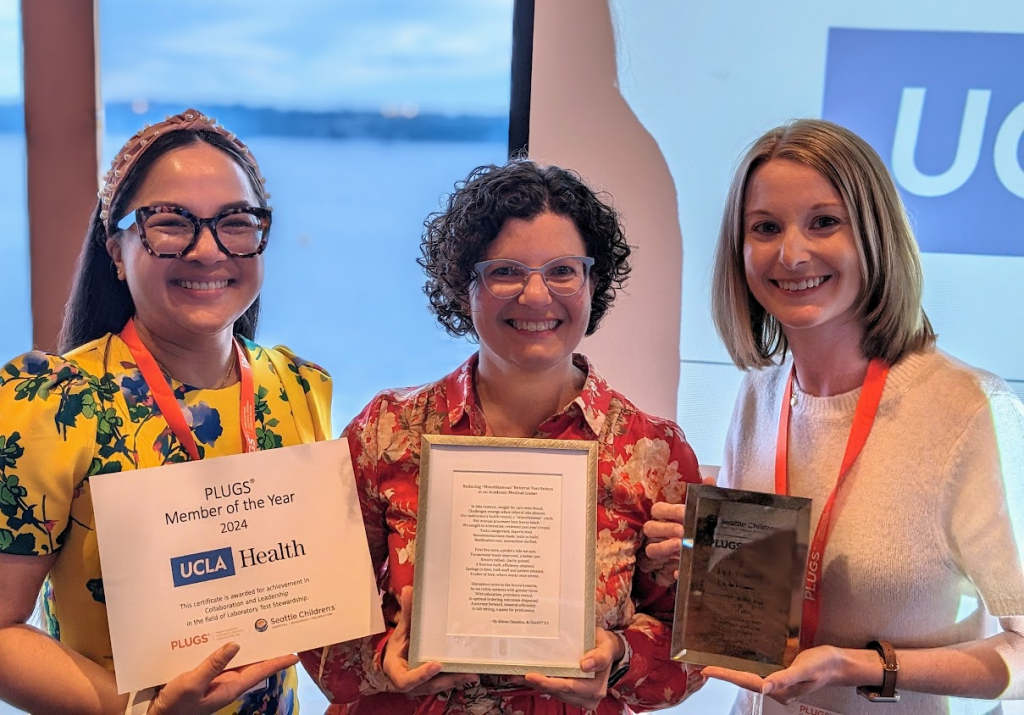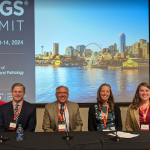PLUGS (Patient-centered Laboratory Utilization Guidance Services) is a non-profit laboratory
stewardship organization founded in 2013 with >100 members representing hospitals, health
systems, diagnostic companies, patient advocacy groups and payers. Seattle Children’s serves
as the quarterback for the network which engages diverse stakeholders focused on improving
test stewardship. The mission of PLUGS is to improve laboratory test access, ordering, retrieval,
interpretation and reimbursement. PLUGS supports this mission through four main initiatives:
tools for program development (including education like the PLUGS Summit), case
management, stewardship standards, and insurance alignment efforts.
Genetic Support Foundation (GSF) is long-time PLUGS member and much of our work at GSF
aligns is complementary to PLUGS’s mission. GSF has participated in the annual PLUGS Summit
since the inaugural event in June 2015. GSF board member Jessie Conta was at the
annual PLUGS Summit and participated in two days of engaging conversations and
presentations, as well as ample networking.
Here are some of the highlights from the 2024 PLUGS Summit:
- Keynote speaker, Luke Ryan, JD, an attorney at the Northampton, Massachusetts law firm of Strehorn, Ryan & Hoose with criminal defense and civil rights litigation experience, explored the risks posed by cognitive and implicit biases in the laboratory setting, highlighting the importance of lab quality through the lens of the Netflix documentary “How to Fix a Drug Scandal”.
- Shannon Haymond, PhD, Vice Chair for Computational Pathology at Lurie Children’s Hospital discussed her computational pathology efforts aimed at building the capacity for advanced data analytics. She provided practical examples of how to facilitate data-informed decision making for clinical care, operations and quality assurance.
- Sara Kim, PhD, Associate Dean for Education Quality Improvement at University of Washington School of Medicine guided the audience in a powerful session exploring strategies for handling interpersonal conflicts with curiosity and courage.
- Krystal Tsosie, PhD, MPH, MA, Assistant Professor and Associate Director of the Biodiversity Knowledge Integration Center at Arizona State University, discussed bioethical engagement of Indigenous communities in genomics and data science to build trust and shared her perspective on integrating genomic and data approaches to assess Indigenous variation contributing to health inequities.
- Kim Foss, MS, CGC described the use of E-consults, a billable communication between providers, to expand genetic services in the primary care setting. A pilot conducted with selected cancer clinics was effective at reducing long wait times and increasing access to genetic testing for patients of all backgrounds.
- Liz Kearney, MS, CGC hosted a discussion with Haley Streff, MS, CGC, Sarah Arneson, MS, CGC, and Caleb Bupp, MD exploring inpatient genetic test stewardship, including considerations of cost, insurance, review criteria, result follow-up and consent. The panelists provided personal insights and experience in balancing these factors.
- Lighting Session 1 featured Sanjai Nagendra, MD (Medical Director – Labcorp) who discussed a reference laboratory perspective on discontinuing the use of clinician-ordered peripheral blood smear review by pathologists; Joely Straseski, PhD (Section Chief of Clinical Chemistry, Medical Director of Endocrinology – ARUP Laboratories) who explored possible solutions to laboratory-specific challenges faced by transgender individuals when measuring hormones; and Rebecca Wilson (Fellow, University of Washington) who explained how to establish a benchmark for ferritin utilization and MCV assessment.
- Lightning Session 2 featured Denvir Niles, MD (Associate Director of Microbiology & Virology – Texas Children’s Hospital) who shared stewardship strategies to support the appropriate use of metagenomic testing in infectious disease testing; April Hall, PhD, MS, CGC (Assistant Professor I Genetic Counselor – University of Wisconsin-Madison) who described the EPSDT benefit and how it can be used to increase access to genomic testing for children <21 years of age covered by Medicaid; and Lina Waughman (Laboratory Genetic Counseling Assistant – Seattle Children’s Hospital) who explained how the creation of translated educational materials for saliva and buccal sample collection improves equity in patient access to care.
- Chris Berlin, MD (Medical Director – WA Permanente Medical Group), Roy Gandolfi, MD (Senior Medical Director – Select Health), Mallory Sdano, MS (Laboratory Genetic Counselor – Intermountain Health), and McKinsey Goodenberger, MS (Laboratory Genetic Counselor Supervisor, Mayo Clinic Laboratories) were part of an engaging panel discussion titled, Opportunities & Strategies to Align Systems & Improve Coverage & Reimbursement for Molecular Tests. The panelists shared their perspectives on barriers to insurance coverage and reimbursement for molecular testing, including lack of coding transparency, complexities of vendor management, and mismatch between technology evolution and policy development. They offered practical suggestions for synchronizing systems, including engaging with experts (like genetic counselors!) to support policy development, correct coding, and vendor assessment. The panel explored the idea of guardrails for medical policies, which would block a significant amount of FWA (fraud, waste, abuse) while leaving sufficient room for providers to practice using their independent medical judgment. Guardrails allow for more beneficial testing, especially in support of the most severely ill patients. (To learn more, check out the PLUGS draft consensus statement which is intended to enable the development of a consistent framework for payer medical necessity policies that reduces fraud, waste, and abuse while providing flexibility in medical practice and decreased administrative burden for all stakeholders. The goal of this proposed framework is broader, future adoption by health plans and laboratory benefits managers as voluntary standards. Feedback on the consensus statement is being gathered until July 19th!)
- The Summit featured 29 posters highlighting laboratory stewardship interventions from PLUGS members around the country. Two posters were recognized as best-abstract winners: Allison Chambliss, “Reducing “Miscellaneous” Referral Test Orders at an Academic Medical Center” and Lina Waughman, “Can We Get That in a Patient’s Language of Care? A Review of Translated Materials for Genetic Testing Alternative Specimen Collection”
The Summit brings together like-minded folks from a variety of roles and perspectives, fostering meaningful discussions about the challenges and opportunities to support appropriate laboratory stewardship. New friendships and collaborations are forged, and old ones nourished through the many opportunities to network and eat delicious food and snacks together. PLUGS membership now extends to insurance payers and laboratory benefits managers, and their presence at the conference enriched this year’s discussions and calls to action for collaboration. The Summit is also the largest gathering of genetic counselors supporting laboratory stewardship, affording us the opportunity to share best practices, commiserate on challenging cases, and celebrate stewardship wins.
We want to recognize and thank the PLUGS team for creating and hosting another excellent Summit and bringing us all together each year for this unique opportunity to learn and connect. Mark your calendars for the 10th annual Summit scheduled for April 2025!!



